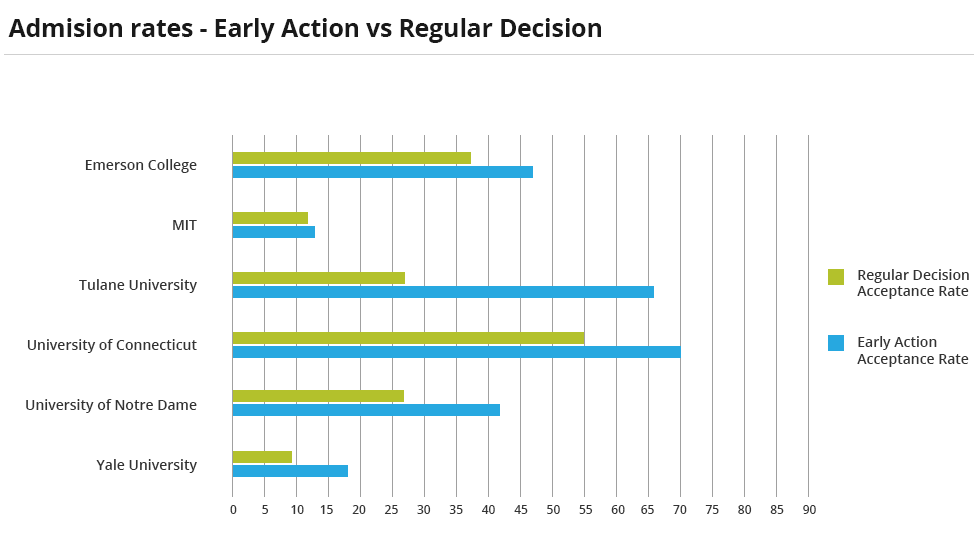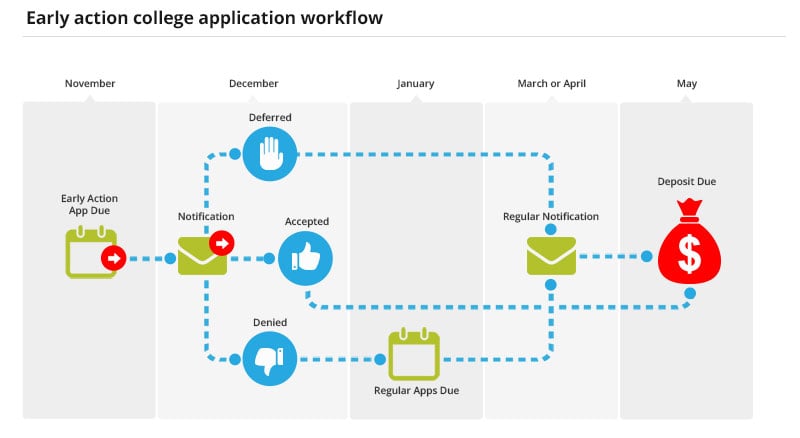Early action is an admissions process available at some schools that allows students to apply before the general application deadline of January 1st. While it definitely has some benefits for students who choose to apply early, it’s not right for everyone. So is early action worth it for you? We help you answer that question below.
What is Early Action?
Early action is an application window available through some colleges and universities in the United States. Instead of applying by January 1st, students are expected to submit their application by November 1st or 15th in order to qualify. Applicants will then hear back on whether or not they were accepted to the college by mid-December.
Early action shouldn’t be confused with early decision. Early decision is also an early application process, but it is binding and you can only apply to one college under the process. If you are accepted to your early decision school, you are obligated to attend the following fall. With early action, however, you can apply to other colleges, including ones in January, and you don’t have to make a final decision on which school you’ll be attending until May 1st.
Is It Worth it to Apply Under Early Action?
There are a few considerations to remember when you’re thinking about applying under early action.
You Can Increase Your Chances of an Admissions Letter at Some Colleges
When you apply to a college under early action, you are showing the school you are serious about attending. It is equivalent to stating that the college is your top choice and you are hoping to attend. Many schools take this into account when sending out admission letters, and data has shown that more students are likely to be accepted under early action than compared to regular decision applicants.
However, early action is becoming more competitive, and acceptance rates are dropping. It is important to note though that acceptance rates at colleges are dropping as a whole, too.

Applying early action can increase your chances of admission at certain colleges and universities. Source.

However, You Have to Finish Your Application Faster
The biggest downside to applying under early action is the fact that you have to complete your application faster. Students have to gather letters of recommendation almost two months early, complete their essays, and submit their SAT or ACT scores. This can be a lot to handle for students entering their senior year. And if your SAT or ACT scores aren’t the best, you might not have time to retake the exams before your early action applications are due.
There are three outcomes to EA.
If you apply early, your application could be accepted, deferred, or denied.

Workflow for applying to college early action.
The strongest EA applicants will be accepted. Usually, notification takes place in early December. Deposits are due at the normal time–typically May 1st.
Eligible applicants who aren’t accepted early may be deferred to the regular admissions pool for reevaluation. These students have the opportunity to submit additional transcripts and test scores while their application is re-evaluated.
Some colleges are more likely to defer than others. Harvard, Princeton, and Yale all defer over half of early action applicants. Stanford defers just 8.5 percent.
Students who aren’t a good fit for the college will be denied admission. Notification takes place in December.
Some colleges have single-choice EA programs.
Single choice early action programs (SCEA) prevent students who participate in them from applying early to other colleges.
Generally, SCEA is offered by only highly selective colleges. These include Harvard, Stanford, and Yale. The majority of early action programs aren’t restrictive.
It’s important to clarify the EA rules with schools where you’re applying. These should be stated clearly on the application. If you’re unsure, contact the college’s admissions office.
Should You Apply for Early Action?
Whether or not it’s worth it to apply for early action to a college is completely up to you. We do have considerations, though, that can help you make your decision.
Go If: You Have a Solid, Complete Application
If you are confident you can complete a good, solid application before your college’s early action due date, there is absolutely no harm in submitting it. You’ll potentially increase your chances of getting accepted, hear back from the school in December, and could have the rest of the school year to relax if this college was your dream school. You can put more energy into your senior studies and applying for scholarships rather than more college applications.
Wait If: Your Application Needs Some Help
However, if you feel that your application is going to be lacking by the tight deadline, it’s highly recommended that you wait. Submitting a half-finished application or even a less-than-stellar application could seriously damage your chances of getting accepted rather than helping. If you take advantage of those extra 6-8 weeks and submit it under regular decision, you might actually have a better chance of getting that acceptance letter. There are several reasons you might want to hold off on submitting it such as less-than-ideal ACT or SAT scores, missing letters of recommendation, and feeling like your application essay still needs work.
It’s worth applying under early action if you already have a completed application. You’ll be doing yourself a favor by getting the work out of the way earlier, and could get rid of some stress by getting an answer from the school in December! However, if your application could benefit from a few more weeks of work, it could be in your best interests to hold off applying to the school so you can put your best foot forward.
Do you want to know more about your chances of being accepted into your dream school if you apply under early action? Our College Match tool gives you insight into some of the best colleges and universities out there for you and your goals – and helps you determine your chances of getting accepted! Use it for free right here.





